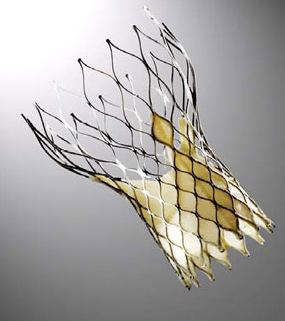
February 3, 2012 — Medtronic Inc. issued a statement on the results of two studies evaluating the use of the Medtronic CoreValve system delivered through the direct aortic implantation approach. Data presented at the Society of Thoracic Surgeons (STS) 48th annual meeting demonstrate positive outcomes when the CoreValve system is implanted using the direct aortic approach, which received CE mark in November 2011. The direct aortic approach is also being evaluated in the Medtronic CoreValve U.S. pivotal trial.
Data presented during a late-breaking session showed procedural success in 92 of 93 patients treated at 12 centers across Europe. There were no procedural deaths, the overall 30-day mortality rate was 9.7 percent, and with experience (after three cases) the 30-day mortality rate was 7 percent. Approximately half of the patients received the replacement valve through a minithoracotomy (an opening between two ribs) and half through a ministernotomy (an opening through the sternum); both minimally invasive procedures are performed without stopping the heart or penetrating the heart's ventricular wall. Most patients (83.9 percent) had been previously diagnosed with peripheral vascular disease and almost a third had undergone previous coronary artery bypass surgery (the mean logistic EuroSCORE was 28.0 ± 15.7, indicating a significant pre-operative risk of mortality with standard surgery).
“We have an increasing body of clinical evidence with regard to the direct aortic approach for transcatheter CoreValve System implantation. This minimal-access surgical approach facilitates accurate deployment of the valve, especially in challenging anatomies,” said Neil E. Moat, MBBS, cardiac surgeon and director of the transcatheter valve program at Royal Brompton Hospital in London and presenter of the data.
In a separate presentation, data from 25 patients were reported from a single center in Italy. All the patients received a CoreValve system implant through the direct aortic approach with a 92 percent (23 of 25 patients) survival rate at 30 days. No patients experienced strokes and four patients were implanted with pacemakers post-procedurally. In this evaluation, all patients had previously diagnosed peripheral vascular disease, and the mean STS score was 11.4 ± 6.2 percent.
“The best access approach to TAVI [transcatheter aortic-valve implantation] is the one that offers the safest conditions and optimal care and recovery for the patient,” said Giuseppe Bruschi, M.D., cardiac surgeon at A De Gasperis Cardiology and Cardiac Surgery Department, Niguarda Ca’ Granda Hospital, Milan, Italy where the first minithoracotomy procedures were performed in humans, and which was instrumental in developing the direct aortic approach. “The clinical results presented today reinforce that direct aortic access using the CoreValve system provides a safe and practical therapy option.”
Since 2007, the Medtronic CoreValve System has been implanted in more than 25,000 people in more than 50 countries outside the United States. The CoreValve system is available in three sizes (26, 29 and 31 mm), and is the only transcatheter aortic valve implantation system approved for direct aortic implantation. It is currently limited to investigational use in the United States.
For more information: www.medtronic.com


 January 05, 2026
January 05, 2026 









